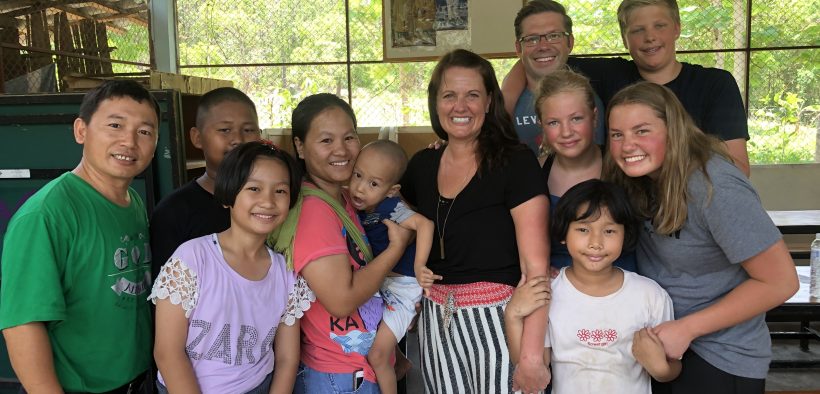Exodus Road Fights Global Sex Trafficking, Says It’s “Not Same Organization” It Was

Matt and Laura Parker thought they had found their calling in 2010: running a girl’s school in Thailand operated by the Joy to the World Foundation.

But as the couple settled into their new ministry, they learned how vulnerable girls wound up being exploited and trapped in southeast Asia’s sex trafficking industry.
“We basically stumbled into the problem, which was right in front of our faces,” says Laura, “and the more we learned about it, the more we couldn’t turn away from it.”
Girls trafficked for sex can face difficult odds. Many are sold into trafficking by impoverished parents. They are exploited by wealthy sex tourists. And their plights are ignored by underfunded, overworked, and/or crooked police officers.
The former high school sweethearts founded their Colorado Springs-based nonprofit The Exodus Road in 2011. And as they explain in their video, “Ordinary: The Story of The Exodus Road,” the next year they announced their first successful rescue—helping to free “Sarah,” a captive 15-year-old Burmese girl who had been sold for sex.
Since then, the $2.8 million organization has rescued 1,505 survivors in six countries, and provided information that helped arrest 820 traffickers. The group also operates in India, the Philippines, and the U.S.
The charity, which has an annual budget of $2.8 million, is not religious, even though Laura and Parker are Christians. It employs 70 people around the world, including 16 in Colorado Springs.
Access to MinistryWatch content is free. However, we hope you will support our work with your prayers and financial gifts. To make a donation, click here.
Dozens of groups in the U.S. combat trafficking. Laura Parker, president of Exodus Road, says it excels in equipping local communities with the resources and training needed to investigate and prosecute sex crimes.
In September, Exodus Road released a free U.S. version of its TraffickWatch Academy, a training program used around the world to educate both law enforcement and ordinary citizens about how to identify and combat trafficking. Parker says a version of the program is being used to train some 20,000 law enforcement officials in Brazil.
Parker says public education is important because trafficking will never disappear until ordinary people learn more about it, volunteer, and donate to groups that combat it—and consider changing their purchasing behavior, including buying fair trade goods to insure “that factory workers in China are not being paid for the stuff you’re buying on the cheap at your local discount store.”
Three-part approach
The Exodus Road employs a three-part approach around the world, as Parker explained:
- Prevention: Helping at-risk kids and families avoid trafficking. “We really believe in equipping national communities, because the most sustainable change comes from within a culture.”
- Intervention: Gathering evidence that help officials arrest and charge traffickers and sex customers. In many cases, Laura’s husband Matt leads these efforts. “Intervention is risky and difficult, law enforcement is overwhelmed and underfunded, and they need our help.”
- Aftercare: Working with partners, it provides aftercare that helps victims recover from the abuse they’ve suffered and develop techniques for earning a living and achieving independence. Exodus Road plans to launch its own Beyond Rescue aftercare program this fall.
Even though Exodus Road has rescued more than 1,500 young women trafficked for sex, Parker admits that’s not enough to stop an “overwhelming” global problem. An estimated 16 million people are trafficked worldwide for labor, and more than four million are trafficked for sex.
“When I want to quit, I think about my own three kids,” she says. “What would I want someone to do on their behalf? Then I try to do that.”
Addressing criticisms
Groups fighting sex trafficking regularly face criticisms about fundraising (Can they back up their claims about rescues and aftercare?) and tactics (Does their work actually increase the market for sex workers?). At MinistryWatch, we ask those same questions.
In February, Exodus Road came under fire from four former contract employees and volunteers who issued an open letter accusing the charity of sexual and financial misconduct, including sexual abuse by staff and the creation of “a culture of sexually violent, explicit language, and sexually inappropriate behavior” that was “established by leadership.” More than 20 people eventually signed on to the letter.
The Colorado Springs Indy published the open letter, and later investigated its claims in a lengthy June article.
Exodus Road had its legal counsel, Lewis Roca Rothgerber Christie, conduct an independent investigation of the claims. It found that inappropriate workplace behavior had taken place, but no sexual abuse. Some employees and contract workers were let go, including one leader who was fired then rehired after a six-month period of training and rehabilitation.
In addition, an audit found that a leader in Thailand had stolen $6,000. Parker says that leader is now gone, and has repaid the stolen funds.
Parker said the complaints provided an opportunity to create a better-managed organization.
“The organization we were in 2017 is not the same organization we are today,” Parker said. “We’re always growing, always learning, and always trying to improve our practices and hiring process.”



